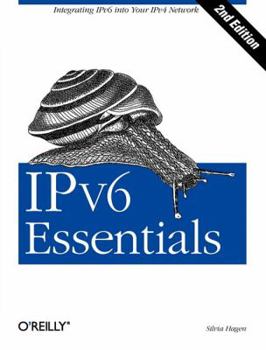IPv6 Essentials
Select Format
Select Condition 
Book Overview
If your organization is gearing up for IPv6, this in-depth book provides the practical information and guidance you need to plan for, design, and implement this vastly improved protocol. Author Silvia... This description may be from another edition of this product.
Format:Paperback
Language:English
ISBN:0596100582
ISBN13:9780596100582
Release Date:August 2006
Publisher:O'Reilly Media
Length:418 Pages
Weight:1.30 lbs.
Dimensions:0.9" x 7.0" x 9.1"
Customer Reviews
4 ratings
Excellent discussion of IPv6 protocols
Published by Thriftbooks.com User , 18 years ago
I read and reviewed "IPv6 Network Administration" (INA) in August 2005 and "Running IPv6" (RI) in January 2006. I gave those books 5 stars, so I had high expectations for "IPv6 Essentials, 2nd Ed" (IE2E). INA and RI are very hands-on, implementation-specific books. IE2E is more concerned with explaining protocols and IPv6 features. In this respect, IE2E is the perfect complement to INA and RI. Silvia Hagen is clearly an IPv6 fan. I was initially skeptical about IPv6 adoption after reading comments by Daniel J. Bernstein and Renesys' Todd Underwood. I still have concerns, but reading case studies in Ch 10 of actual IPv6 deployments helped me understand the author's enthusiasm. Sylvia is less critical of IPv6 than INA and RI, which share recommendations for real-world usage. I still have serious concerns with security vulnerabilities in autoconfiguration (one of the major "cost savers" of IPv6) and IPSec key management (the other major "improvement" in IPv6, basically requiring PKI). I also believe the emphasis on "end-node protection" (security models, pp 122-3) at the expense of network-level protection is insufficient. Transitioning to IPv6 is also not as easy as IE2E implies, especially for multihomed sites with provider independent address space. (SHIM6 might not be sufficient or workable, and IPv6 doesn't have PIAS.) The strongest aspect of IE2E is the thorough coverage of IPv6 protocols. Plenty of people like to point to very old TCP/IP books as "the Bibles" of networking, but the world has changed during the last decade. IE2E offers a very strong chapter on Mobile IPv6 and explains how that version is superior to IPv4 (mainly due to Route Optimization). Sylvia's SSH port forwarding trick (p 277) was obvious but something I hadn't considered previously -- very cool. IE2E manages to keep a readable size of around 400 pages by citing plenty of RFCs and drafts, which is smart given the state of the protocols. The book is also very up-to-date and technically accurate, as far as I could tell. I had a minor problem with the author's perceptions of threats and vulnerabilities at the start of the security chapter. She uses the former term but means the latter term. If you want implementation details, such as commands to run and techniques to try, I recommend INA or RI. If you want to really understand IPv6, I recommend IE2E. Since you should ideally want both sets of skills, you should have at least two IPv6 books on your desk. Postscript: I suggest the third edition offer the set of network traces featured in IE2E for download, so readers can look at them individually.
The book you need for covering all IPv6 related topics.
Published by Thriftbooks.com User , 20 years ago
I am an engineer who has some know how in IPv6. This book is the best out of what available today in explaining all IPv6 major subjects. Reading this book can give a whole and a clear picture of what is underneath the hood. I used it to read on a topic and only afterwards I referred for the RFC for the details. Other books that I came across do not do a good job as this book is doing. If you want to really understand how things are working in IPv6, this is the book to go!
An excellent resource for IPv6
Published by Thriftbooks.com User , 21 years ago
This is an excellent book on IPv6 that does not shy away from providing details at every corner of the protocol. I've seen books in the past with twice the pages but hardly provide a fraction of the information you will find in this book, presented in a concise but comprehensive manner.It is an excellent resource for IPv6 particularly to readers with background in IPv4. Not only does the author try to highlight the differences between the two protocols (take for example how the two header formats have evolved), she also explains the motivation behind each change along the way.Of course, the author's diligent quotation of all relevant RFCs, including the ones being obsoleted where applicable, turns the book into a valuable "hypertext style" reference for IPv6, where the reader can delve further into particular areas of interest.
An excellent resource for IPv6
Published by Thriftbooks.com User , 21 years ago
This is an excellent book on IPv6 that does not shy away from providing details at every corner of the protocol. I've seen books in the past with twice the pages but hardly provide a fraction of the information you will find in this book, presented in a concise but comprehensive manner.It is an excellent resource for IPv6 particularly to readers with background in IPv4. Not only does the author try to highlight the differences between the two protocols (take for example how the new header format has evolved), she also explains the motivation behind each change along the way.Of course, the author's diligent quotation of all relevant RFCs, including the ones being obsoleted where applicable, turns the book into a valuable "hypertext style" reference for IPv6, where the reader can delve further into particular areas of interest.





